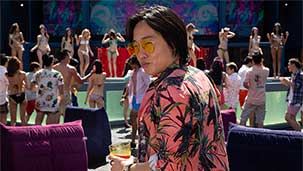Finding the perfect song for a movie seems like it should be easy. When it works, it always feels obvious. Could be the frantic energy of a Rolling Stones tune that takes a scene to new heights (see: every Martin Scorsese movie) or a romantic ballad that turns a corny love scene into something iconic (“Unchained Melody” in Ghost, anyone?). Other times, a filmmaker makes it impossible for you to listen to a song the same way again (think “Stuck in the Middle With You” from Reservoir Dogs).
Using a song ironically, however, can be a big risk—for the musicians as much as the filmmakers. Which is why it must have felt like a bad joke when the idea was first floated to use the song “Yellow” in a movie called Crazy Rich Asians. Ironic isn’t quite the right word—it’s more like an act of cringe-worthy bad taste, or an epic troll. The kind that might get you completely ostracized from society (or elected President).
Based on what I’ve read since seeing the movie, it’s likely that you tried to talk director John Chu out of using the song. He’s the one who wrote an impassioned letter to Coldplay begging them for the right to use the song in the film’s climax, and, thereby, re-contextualize a word that is otherwise loaded with negative connotations (both in terms of race and cowardice).
The twist, here, is that the song is a cover. In Mandarin. By Asian-American singer Katherine Ho (a former The Voice contestant). But that didn’t stop the alarm bells from going off in my head once I recognized the tune. But, like most aspects of Crazy Rich Asians, it both embraces and undermines familiar stereotypes, and does so to such great effect that it’s one of the most moving romantic comedies in years.
The story itself begins with a universal fear – meeting the parents of the person you’re dating – and then amps it up by a few billion dollars and few thousand years of cultural differences. And while the drama is slow to unfold, the story makes its way into the third act with an enviable confidence. The understated tension and repressed emotions, which are designed to be culturally specific, eventually boil over—thanks, in no small part, to your music choices. Specifically, it’s the cover of “Falling in Love With You” by Kina Grannis, which is played during the centerpiece wedding, that took the film to new heights. It’s at that moment, where multiple storylines collide during a wildly inventive and moving ceremony, that I could almost feel you and your director whispering in my ear: “Don’t worry, we got this”.
It was a relief, because, as most people may have heard, there’s a lot riding on the first Hollywood film in the last 25 years to star an all Asian-American cast. The decision to make a movie – rather than a much more lucrative Netflix trilogy (which was offered to the novel’s author Kevin Kwan) – was a big gamble. Because going to theatres certainly wasn’t the obvious choice. But it was the right choice. Even though it might not seem as obvious as covering “Material Girl” and “Money (That’s What I Want)” - which also worked great, so congrats.
Sincerely,

Christopher







